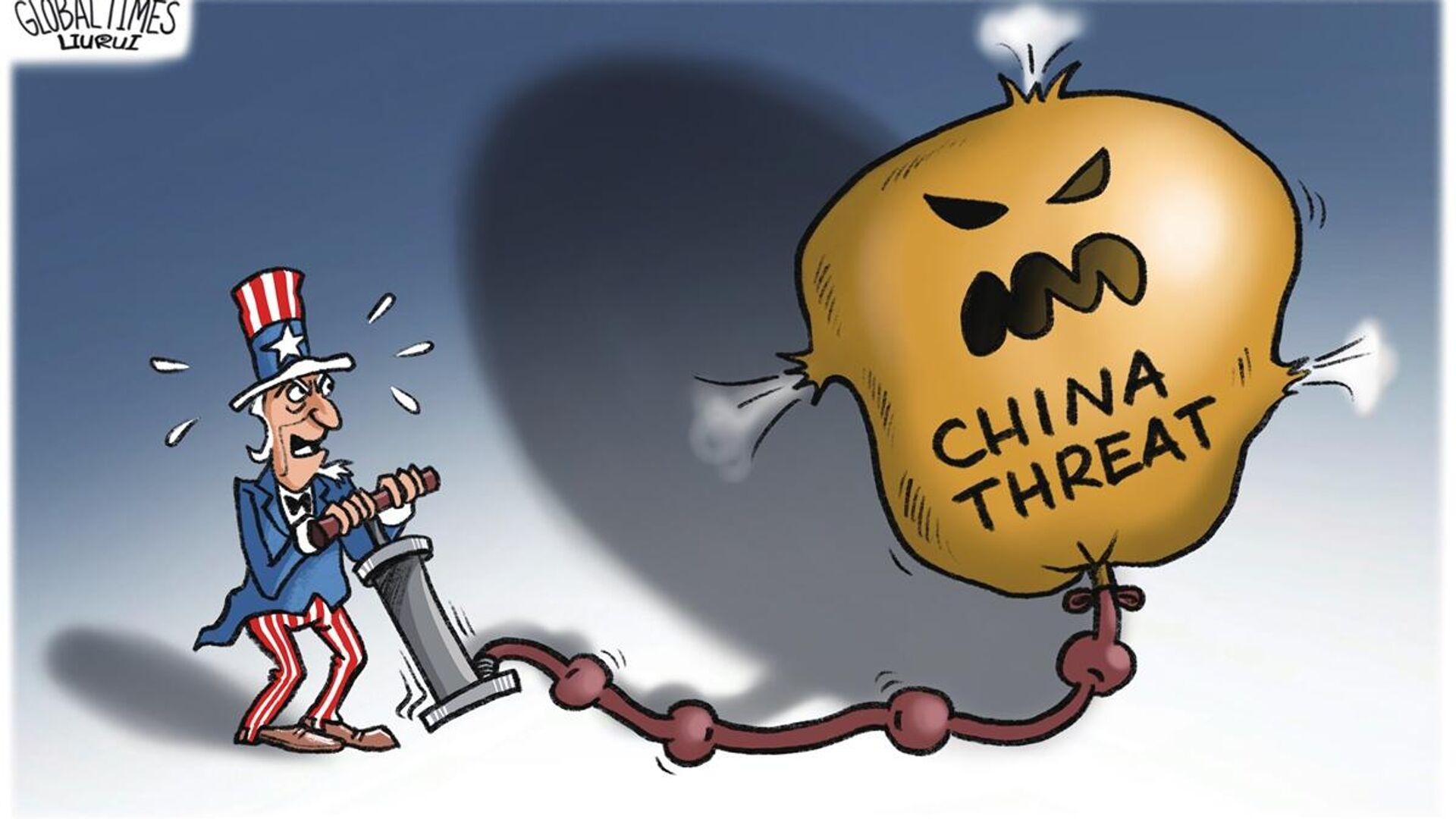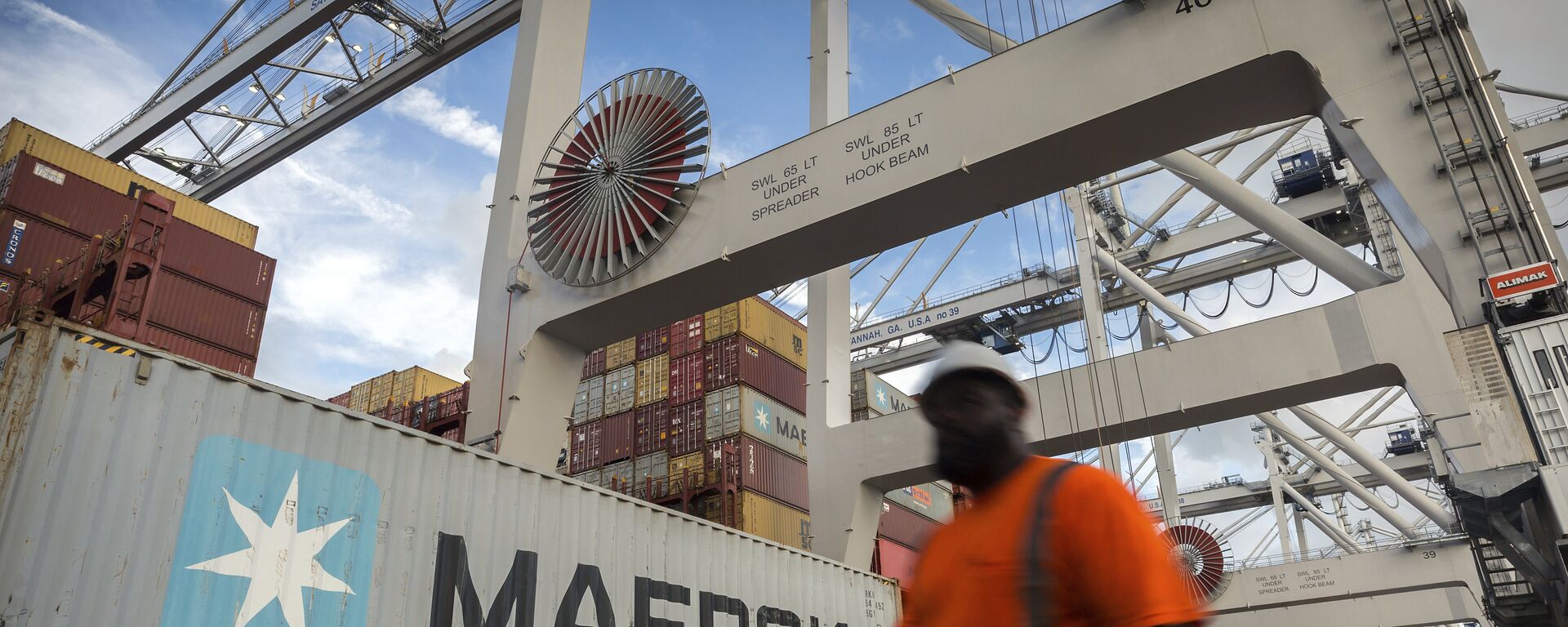https://sputnikglobe.com/20230307/from-tiktok-to-chinese-sranes-what-else-is-there-that-us-is-not-afraid-of-1108146710.html
From TikTok to Chinese Сranes, What Else is There That US is Not Afraid of?
From TikTok to Chinese Сranes, What Else is There That US is Not Afraid of?
Sputnik International
Recently, some American politicians have one more concern. They worried that giant Chinese-made cranes operating at American ports could become hidden spying tools for China.
2023-03-07T12:30+0000
2023-03-07T12:30+0000
2023-03-07T12:30+0000
americas
us
us-china relations
paranoia
https://cdn1.img.sputnikglobe.com/img/07e7/03/07/1108146501_0:23:1200:698_1920x0_80_0_0_d64cd9c2e4e6b3356b4e519e967aeca9.jpg
This absurd claim, which fits the narrative style of American science fiction movies, is not only baseless but also typical of paranoid thinking. It's unbelievable that the US, as a superpower, could be scared by cranes at ports and imagine them as spying tools.From Huawei to TikTok, from balloons to cranes, American politicians' hysteria over so-called national security is becoming increasingly perverse. Observers suggest that if American politicians are really so afraid of "Made in China," they should take off all their clothes and run naked together. After all, the clothes that many Americans wear, even if not made in China, are made of fabrics provided by China or manufactured with equipment from China. How can US politicians dare to wear clothes made in China when they are afraid of a crane at a distant port? Is the next step, in the minds of these politicians, to spread rumors that Chinese clothes have gene-level surveillance that will threaten national security? It is precisely because of their excellent performance and reliable quality that Chinese products, including giant cranes, are widely used around the world. US government officials and media outlets, in fact, know this well, yet they are deliberately downplaying it to suit their own interests.The intention behind such absurd, pathological and irrational hype is very clear - to hijack domestic and foreign public opinion with the collaboration of media and politicians, thus creating an unfriendly, extreme and confrontational environment toward China. This is to ensure that when US politicians implement tough policies against China, they can sustain long-term support and recognition both domestically and internationally. In fact, the emergence of such remarks also exposes the anxiety of US politicians about the decline of their own national strength. Shen Yi, a professor at the School of International Relations and Public Affairs of Fudan University, told the Global Times that a country can have legitimate national security concerns and maintain reasonable sensitivity to national security. However, the US today blames all its backwardness and shortcomings on others, thereby failing to reflect on itself but carrying out malicious attacks against others hysterically. This is a manifestation of the decline of US hegemony. Washington has sensed its declining hegemony and thus taken preventive action against challengers.Washington's hyper-vigilance makes Chinese people wonder how the US has come to such a state. This is not just anxiety; it is a kind of persecution delusion, a form of excessive paranoia.Perhaps what the US needs now is some kind of collective calming therapy.Ironically, from Huawei to cranes, Washington has been enjoying the benefits of affordable and quality Chinese manufacturing but has never stopped seizing any opportunity to play the "China threat card." Not only does it hype up security threats from China, it also continuously pressures its allies to stop using Chinese equipment.The US has always been like this: enjoying the benefits while letting others bear the cost or consequences. The situation with the Nord Stream pipelines makes it clear that other countries suffer while Washington benefits. The US' strategy of sacrificing other countries to meet its own needs is a selfish approach. One must remain vigilant and avoid being used or treated as Washington's pawn.In addition, American politicians's unwarranted concerns about Chinese cranes are clearly lacking in actual basis.He noted that if all normal market competition is viewed by Washington as a security threat, then it will ultimately suppress the US' own innovation and progress.This article originally appeared on Global Times.
https://sputnikglobe.com/20230305/not-by-balloons-alone-us-officials-worry-chinese-port-cranes-could-spy-on-american-cargo-1108074200.html
https://sputnikglobe.com/20230301/buildup-for-war-us-spins-covid-lab-leak-narrative-to-pin-blame-on-china-1107899842.html
americas
Sputnik International
feedback@sputniknews.com
+74956456601
MIA „Rossiya Segodnya“
2023
Sputnik International
feedback@sputniknews.com
+74956456601
MIA „Rossiya Segodnya“
News
en_EN
Sputnik International
feedback@sputniknews.com
+74956456601
MIA „Rossiya Segodnya“
Sputnik International
feedback@sputniknews.com
+74956456601
MIA „Rossiya Segodnya“
us bloating chinese threat, us exploits alleged chinese threat, us anti-china bias, american anti-choina paranoia
us bloating chinese threat, us exploits alleged chinese threat, us anti-china bias, american anti-choina paranoia
From TikTok to Chinese Сranes, What Else is There That US is Not Afraid of?
Recently, some American politicians have one more concern. They worried that giant Chinese-made cranes operating at American ports could become hidden spying tools for China.
This absurd claim, which fits the narrative style of American science fiction movies, is not only baseless but also typical of
paranoid thinking. It's unbelievable that the US, as a superpower, could be scared by cranes at ports and imagine them as spying tools.
From Huawei to TikTok, from balloons to cranes, American politicians' hysteria over so-called national security is becoming increasingly perverse. Observers suggest that if American politicians are really so afraid of "
Made in China," they should take off all their clothes and run naked together. After all, the clothes that many Americans wear, even if not made in China, are made of fabrics provided by China or manufactured with equipment from China.
How can US politicians dare to wear clothes made in China when they are afraid of a crane at a distant port? Is the next step, in the minds of these politicians, to spread rumors that Chinese clothes have gene-level surveillance that will threaten national security?
It is precisely because of their excellent performance and reliable quality that Chinese products, including giant cranes, are widely used around the world. US government officials and media outlets, in fact, know this well, yet they are deliberately downplaying it to suit their own interests.
The intention behind such absurd, pathological and irrational hype is very clear - to hijack domestic and foreign public opinion with the collaboration of media and politicians, thus creating an
unfriendly, extreme and confrontational environment toward China. This is to ensure that when US politicians implement tough policies against China, they can sustain long-term support and recognition both domestically and internationally.
In fact, the emergence of such remarks also exposes the anxiety of US politicians about the decline of their own national strength.
Shen Yi, a professor at the School of International Relations and Public Affairs of Fudan University, told the Global Times that a country can have legitimate national security concerns and maintain reasonable sensitivity to national security. However, the US today blames all its backwardness and shortcomings on others, thereby failing to reflect on itself but carrying out
malicious attacks against others hysterically. This is a manifestation of the decline of US hegemony. Washington has sensed its declining hegemony and thus taken preventive action against challengers.
Washington's hyper-vigilance makes Chinese people wonder how the US has come to such a state. This is not just anxiety; it is a kind of persecution delusion, a form of excessive paranoia.
Perhaps what the US needs now is some kind of collective calming therapy.
Ironically, from Huawei to cranes, Washington has been enjoying the benefits of affordable and quality Chinese manufacturing but has never stopped seizing any opportunity to play the "
China threat card." Not only does it
hype up security threats from China, it also continuously pressures its allies to stop using Chinese equipment.
The US has always been like this: enjoying the benefits while letting others bear the cost or consequences. The
situation with the Nord Stream pipelines makes it clear that other countries suffer while Washington benefits. The US'
strategy of sacrificing other countries to meet its own needs is a selfish approach. One must remain vigilant and avoid being used or treated as Washington's pawn.
In addition, American politicians's unwarranted concerns about Chinese cranes are clearly lacking in actual basis.
"The global industrial chain is closely interconnected, if Washington does not have a unified standard and only claims that Chinese products are a threat, then such a practice is undoubtedly discriminatory and non-market behavior, which is not conducive to the US economy," said Lu Xiang, a research fellow at the Chinese Academy of Social Sciences.
He noted that if all normal market competition is viewed by Washington as a security threat, then it will ultimately suppress the US' own innovation and progress.
This article originally appeared on Global Times.




